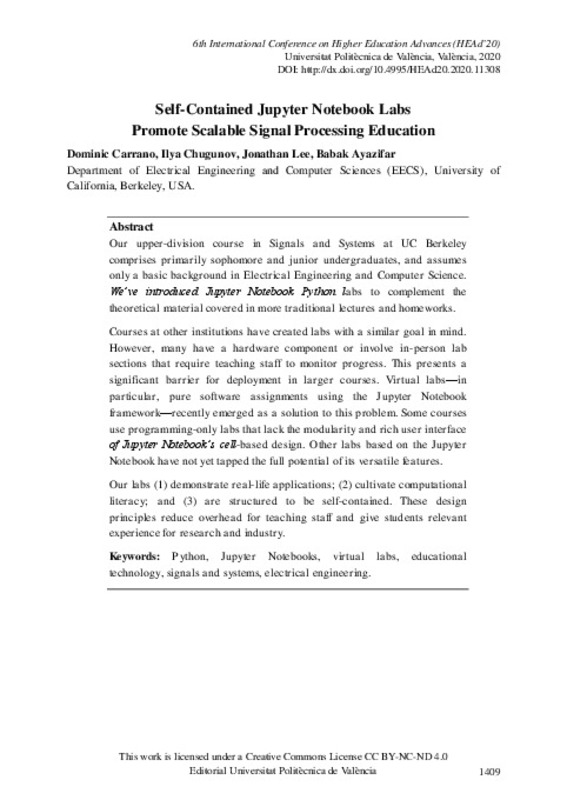JavaScript is disabled for your browser. Some features of this site may not work without it.
Buscar en RiuNet
Listar
Mi cuenta
Estadísticas
Ayuda RiuNet
Admin. UPV
Self-Contained Jupyter Notebook Labs Promote Scalable Signal Processing Education
Mostrar el registro sencillo del ítem
Ficheros en el ítem
| dc.contributor.author | Carrano, Dominic
|
es_ES |
| dc.contributor.author | Chugunov, Ilya
|
es_ES |
| dc.contributor.author | Lee, Jonathan
|
es_ES |
| dc.contributor.author | Ayazifar, Babak
|
es_ES |
| dc.date.accessioned | 2020-06-11T08:12:02Z | |
| dc.date.available | 2020-06-11T08:12:02Z | |
| dc.date.issued | 2020-04-21 | |
| dc.identifier.isbn | 9788490488119 | |
| dc.identifier.issn | 2603-5871 | |
| dc.identifier.uri | http://hdl.handle.net/10251/146081 | |
| dc.description.abstract | [EN] Our upper-division course in Signals and Systems at UC Berkeley comprises primarily sophomore and junior undergraduates, and assumes only a basic background in Electrical Engineering and Computer Science. We’ve introduced Jupyter Notebook Python labs to complement the theoretical material covered in more traditional lectures and homeworks. Courses at other institutions have created labs with a similar goal in mind. However, many have a hardware component or involve in-person lab sections that require teaching staff to monitor progress. This presents a significant barrier for deployment in larger courses. Virtual labs—in particular, pure software assignments using the Jupyter Notebook framework—recently emerged as a solution to this problem. Some courses use programming-only labs that lack the modularity and rich user interface of Jupyter Notebook’s cell-based design. Other labs based on the Jupyter Notebook have not yet tapped the full potential of its versatile features. Our labs (1) demonstrate real-life applications; (2) cultivate computational literacy; and (3) are structured to be self-contained. These design principles reduce overhead for teaching staff and give students relevant experience for research and industry. | es_ES |
| dc.language | Inglés | es_ES |
| dc.publisher | Editorial Universitat Politècnica de València | es_ES |
| dc.relation.ispartof | 6th International Conference on Higher Education Advances (HEAd'20) | |
| dc.rights | Reconocimiento - No comercial - Sin obra derivada (by-nc-nd) | es_ES |
| dc.subject | Higher Education | es_ES |
| dc.subject | Learning | es_ES |
| dc.subject | Educational systems | es_ES |
| dc.subject | Teaching | es_ES |
| dc.subject | Python | es_ES |
| dc.subject | Jupyter Notebooks | es_ES |
| dc.subject | Virtual labs | es_ES |
| dc.subject | Educational technology | es_ES |
| dc.subject | Signals and systems | es_ES |
| dc.subject | Electrical engineering. | es_ES |
| dc.title | Self-Contained Jupyter Notebook Labs Promote Scalable Signal Processing Education | es_ES |
| dc.type | Capítulo de libro | es_ES |
| dc.type | Comunicación en congreso | es_ES |
| dc.identifier.doi | 10.4995/HEAd20.2020.11308 | |
| dc.rights.accessRights | Abierto | es_ES |
| dc.description.bibliographicCitation | Carrano, D.; Chugunov, I.; Lee, J.; Ayazifar, B. (2020). Self-Contained Jupyter Notebook Labs Promote Scalable Signal Processing Education. En 6th International Conference on Higher Education Advances (HEAd'20). Editorial Universitat Politècnica de València. (30-05-2020):1409-1416. https://doi.org/10.4995/HEAd20.2020.11308 | es_ES |
| dc.description.accrualMethod | OCS | es_ES |
| dc.relation.conferencename | Sixth International Conference on Higher Education Advances | es_ES |
| dc.relation.conferencedate | Junio 02-05,2020 | es_ES |
| dc.relation.conferenceplace | València, Spain | es_ES |
| dc.relation.publisherversion | http://ocs.editorial.upv.es/index.php/HEAD/HEAd20/paper/view/11308 | es_ES |
| dc.description.upvformatpinicio | 1409 | es_ES |
| dc.description.upvformatpfin | 1416 | es_ES |
| dc.type.version | info:eu-repo/semantics/publishedVersion | es_ES |
| dc.description.issue | 30-05-2020 | |
| dc.relation.pasarela | OCS\11308 | es_ES |








